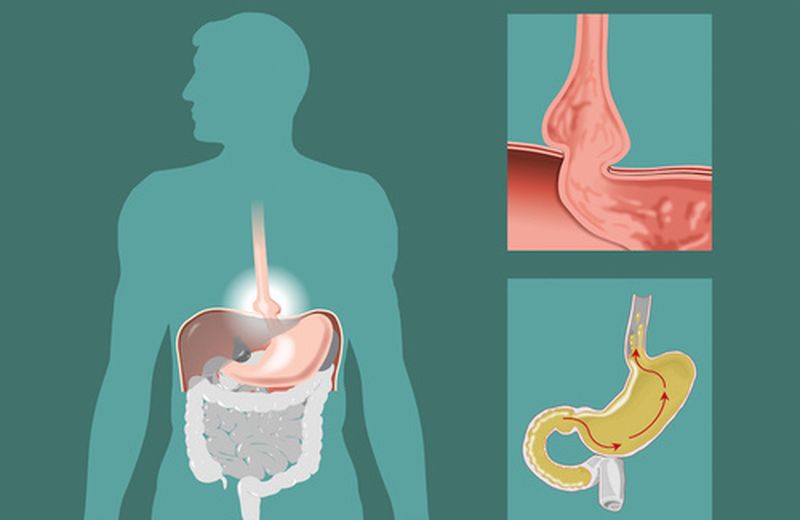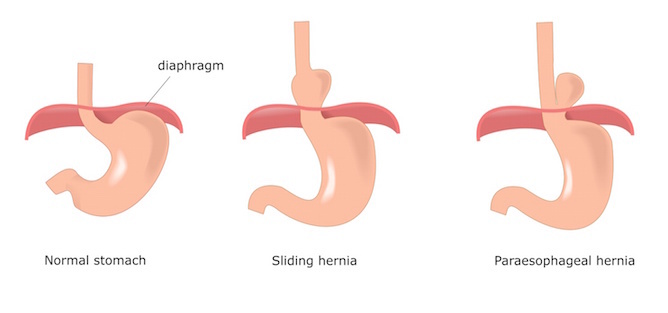Hiatal hernia: how to recognize the symptoms?
What is a hiatal hernia and how to recognize its symptoms in order to adopt the right treatment

It seems that, out of 3 people who suffer from it, only one feels the symptoms. Hiatal hernia is quite common and, if not recognized, it could cause bothersome symptoms.
It is therefore good to know what exactly a hiatal hernia is and, without alarmism, to know how to recognize the symptoms , in order to be able to remedy it and soon return to being well. Let’s try to understand more.
Hiatal hernia: symptoms
In most cases, the hiatal hernia is asymptomatic and comes to light only as a result of diagnostic investigations made to investigate other pathologies. However, pronounced hiatal hernias can mainly cause gastroesophageal reflux , which causes burning sensation in the chest or throat, with a bitter or acid taste in the mouth and risk of tooth erosion.
However, there are other apparently negligible symptoms that can lead to suspicion of a hiatal hernia, if they appear frequently or more than one at the same time:
- difficulty swallowing ;
- dry cough in the absence of colds;
- bitter regurgitation of food or liquids;
- feeling of a lump in the throat and difficulty in breathing;
- presence of pain when taking hot liquids;
- frequent belching .
Most often, the symptoms of a hiatus hernia are aggravated when you try to lean forward or lie down or lift heavy objects .
In pregnant women , a hiatal hernia may appear for the first time or, if already present, its symptoms may be aggravated.
Hiatal hernia, which foods to avoid?
Hiatal hernia: what it is
Whenever, in our body, an internal part (organ or muscle) moves to an area other than that of its physiological site, we speak of a hernia .
In the case of a hiatal hernia , it is an anatomical modification of the stomach : part of the stomach insinuates itself into the ” hiatus diaframmaticus “, which is an opening in the diaphragm (the muscular wall that separates the chest from the abdomen).
There are different types of hiatal hernia, the 2 main ones are the ” slipping ” or sliding one and the ” rolling ” or paraesophageal one.
A sliding hiatus hernia occurs when the stomach and the initial part of the esophagus that joins the stomach slide through the “diaphragmatic hiatus”. This is the most common type.
A paraesophageal hiatus hernia occurs when part of the fundus of the stomach rotates through the “diaphragmatic hiatus” and is placed between the esophagus and the hiatus wall. It is a rather risky situation of excessive compression of the stomach between the esophagus and the hiatus.

Hiatal hernia: causes
Most of the time the causes are unknown : some people may be born with a larger “diaphragmatic hiatus” or, in situations such as pregnancy or severe obesity , a sharp increase in pressure in the area such as a sudden movement, a sneeze, a loud blow coughing can cause the stomach to slip.
There may be a genetic predisposition in the case of weak collagenous supporting tissues. Also in these cases a cough, an excessive effort, a movement such as crossing the legs can cause the herniation. In subjects with this genetic predisposition, hemorrhoids, inguinal hernias, renal ptosis (lowering of the kidney from its original location) are also very frequent.
The risk of hiatal hernia increases with age , in severe obesity and in smokers.
When to worry? Make an appointment with your doctor if symptoms are particularly severe or persistent .






























+ There are no comments
Add yours